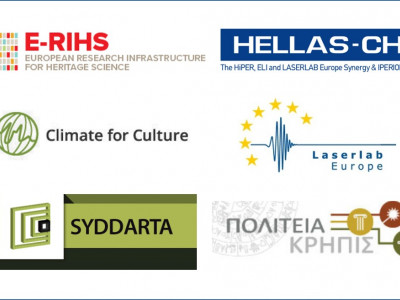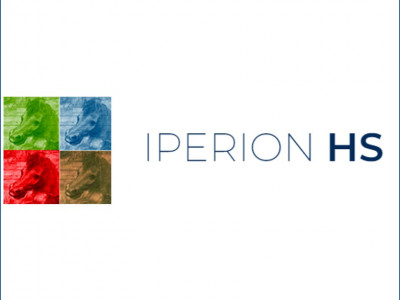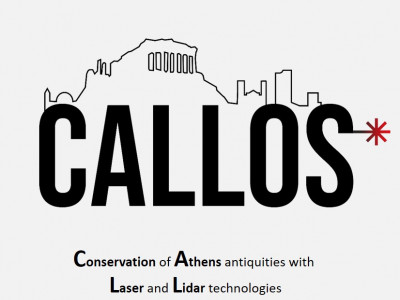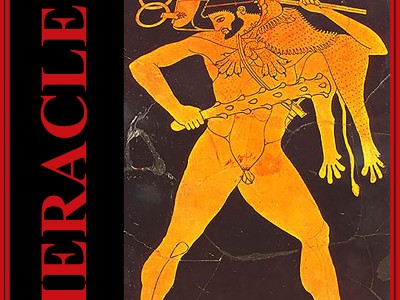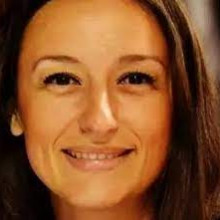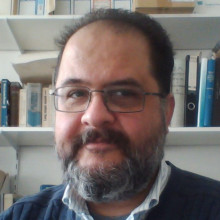
Petros Samartzis is currently a Principal Researcher at IESL-FORTH. He graduated from the Chemistry Department of the University of Crete in 1996 and received his Ph.D. in Physical Chemistry from the same Department in 2003, under the supervision of Theo Kitsopoulos . He carried out post-doctoral research in the USA, initially at the University of California Santa Barbara (2003-2007) under the supervision of Alec Wodtke and then at the California Institute of Technology-Caltech (2007-2009) under the supervision of A. Zewail (Nobel in Chemistry 1999). He returned to Greece and has been working at IESL-FORTH since 2010.
PS studies Chemistry using photons, preferably laser photons. His research interests range from the dynamics of excited molecular states and the structural and energetic monitoring of chemical reactivity to the spectroscopic detection of target molecules in complex chemical mixtures. Among other things, he has studied small molecule photolysis mechanisms, photolytic production of spin-polarized atomic hydrogen, spectroscopic detection and characterization of high energy density molecules, cluster photolysis mechanisms, excitation/relaxation processes in organic crystals and carbon nanotubes, interactions at high-energy molecular excited states and spectroscopic fossil fuel adulteration detection. Over the years he has used a variety of techniques (optical & laser spectroscopy, mass spectrometry, Velocity Mapping/Slice Imaging, Ultrafast Electron Diffraction), mass spectrometry) and tools (lasers, high vacuum, custom TOF mass spectrometers, position-sensitive detectors, custom-built electron diffractometers, optical spectrometers) which he aims to further develop and expand.
Education
- 2003, PhD., Chemistry Department, University of Crete, Greece
- 1996, BSc., Chemistry Department, University of Crete, Greece
Career
- 2019-today, Principal Researcher, IESL-FORTH, Greece
- 2015-2019, Assistant Researcher, IESL-FORTH, Greece
- 2010-2015, Contracted Researcher, IESL-FORTH, Greece
- 2007-2009, Postdoctoral Scholar, Chemistry & Chem. Engineering, California Institute of Technology (Caltech), USA
- 2003-2007, Postdoc, Chemistry Dpt., University of California, Santa Barbara (UCSB), USA
Interests
- Laser Chemistry
- Dynamics of excited molecules and reaction intermediates
- Structural Dynamics in chemical reactions
- Detection of target molecules in chemical mixtures
- Development of new techniques and instruments
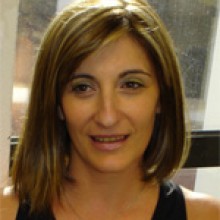
Dr. Anthi Ranella is an Assistant Researcher at IESL-FORTH and leads the Tissue Engineering –Regenerative Medicine and Immuno-engineering Lab (TERMIM Lab). She received her received PhD in 2005 from the Department of Biology of University of Crete.
Her fields of interests comprise mainly the study of the basic biological and biophysical processes at the molecular and cellular level, the understanding of the physicochemical mechanisms that take place at the interface between cells and biomaterials in micro / nano scale and the examination of the potential medical and/or clinical applications of optimized artificial tissue scaffolds.
In the interdisciplinary area of her interest three post-doctoral research scientists, three PhD, two MSc and two undergraduate students, originated from different scientific fields, are employed. Her research activities have led to the granting of two patents, she has published 39 peer reviewed papers with more than 1200 citations (Scopus h index: 18), 4 chapters in international scientific books, while she serves as a reviewer in many peer-review journals.
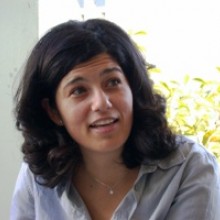
Paraskevi Pouli is a Senior Application Scientist at IESL-FORTH, Photonics for Heritage Science group, in charge of developing novel laser technologies for restoration of art and antiquities.
She holds a degree in Physics from Aristotle University of Thessaloniki, Greece and a Ph.D. in Physics from Loughborough University, UK. Her PhD thesis, entitled “Laser cleaning studies on stonework and polychromed surfaces”, was supervised by prof. D.C. Emmony.
She joined IESL-FORTH on 2000 with research interests focused on the investigation of laser ablation on CH materials and the development of laser-cleaning methodologies on real cases. The understanding of laser induced discoloration (yellowing of marble, blackening of pigments) and optimization and monitoring of cleaning process are her research priorities. She is involved in a number of EU (H2020 HERACLES, H2020 IPERION-CH, FP7-CHARISMA, FP5-PROMET, etc.) and nationally (KRIPIS - POLITEIA I and II, LASTOR, MOBILART, CRINNO II etc.) funded research projects.
Her research has been published in over 49 publications (4 invited) in peer reviewed journals and conference proceedings, reflecting in more than 700 citations (according to SCOPUS) while she has been presenting her work (8 invited) in major international conferences and workshops in the field. Since 2009 she is a member of the International scientific committee of the LACONA (Lasers in the Conservation of Artworks) Conference Series, while she has been also actively contributing in the organization of several other conferences.
Since 2012 she serves as technical manager of the “OPTO-CH” series of thematic training activities initiated by IESL-FORTH, which have attracted up to now more than 200 conservators-restorers and young scientists with the aim to get familiar with the use of Laser technologies in the analysis, diagnosis and conservation of CH assets. Over the past few years she is vigorously participating to EU and national initiatives on the development of E-RIHS (European Research Infrastructures for Heritage Science) and E-RIHS.gr Research Infrastructures focused in the field of Heritage Science.
Since 2001 she is responsible, on behalf of IESL-FORTH, for the laser-cleaning projects on the Athens Acropolis sculptures (i.e. the Parthenon West Frieze, the ceiling of the Erechtheion Prostasis, the Caryatids at the Acropolis Museum etc.). The outcome of this collaboration is a prototype laser system and a laser cleaning methodology customarily developed in order to ensure the removal of thick pollution accumulations in a controlled and safe way for both the object and the operator. In this context the Acropolis Museum and IESL-FORTH have been awarded the 2012 Keck Award by the International Institute for Conservation of Historic and Artistic Works (IIC) for their collaboration regarding the “laser rejuvenation of Caryatids opens to the public at the Acropolis Museum: A link between ancient and modern Greece” (http://www.iiconservation.org/node/3362).
Education
- 2000, PhD, Physics Department, Loughborough University, UK
- 1995, BSc, Physics Department, Aristotle University of Thessaloniki, Greece
Interests
- Investigation of laser ablation mechanisms & development of cleaning methodologies on a variety of Cultural Heritage challenges
- Understanding & prevention of side effects upon laser cleaning; i.e. yellowing of sensitive substrates & blackening of pigments.
- Optimization of the cleaning process using novel & prototype laser systems & methodologies & monitoring the cleaning intervention through spectral imaging, holographic interferometry & laser spectroscopy.
Awards/Prizes/Distinctions
- 2012 Keck award of IIC http://www.iiconservation.org/node/3362
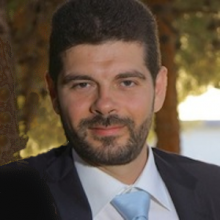
Dr. Vassilis Papadakis is an Assistant Professor at the University of West Attica. He has more than 20 years of experience in research and education in Greece and abroad. He has worked and lectured as a researcher at the Technical University of Delft, the Foundation for Research and Technology, the University of Crete, and the Hellenic Mediterranean University in topics related to diagnosis and imaging.
Vassilis M. Papadakis was a research associate at the Institute of Molecular Biology and Biotechnology, Foundation for Research and Technology – Hellas. He was the founder and head of the Bio NDT lab.
His main research interests are in applied physics and in particular in imaging and spectroscopic applications. He is interested in the characterization of bio-materials, ranging from DNA, proteins, live cells, and tissues.
He has strong experience in developing imaging spectroscopy instrumentation, including multi- and hyper-spectral imaging systems and applying a wide range of techniques, including reflection and absorption spectral imaging, Raman and FTIR spectroscopy, and cavity ring-down spectroscopy. He has worked on analyzing materials from medicine, biology, cultural heritage, aerospace, and others.
He has published more than 55 papers in international journals and more than 50 conference presentations.
Education
- Ph.D at Department of Biology, School of Science and Technology, University of Crete, Greece
- Ph.D at Department of Ophthalmology, Vardinoyanion Eye Institute of Crete, School of Medicine, University Crete, Greece
- B.Sc. at Depatment of Physics with specialization in Microelectronics, University of Crete, Greece
Career
- IMBB-FORTH, Post Doc (2014- today)
- IESL - FORTH, Post Doc (2002-2014)
Interests
- Spectral Imaging
- Biomedical Optics
- Computer Vision
- Biophotonics
- Image Proccessing


Meropi Mari is a postdoctoral researcher in the Institute of Electronic Structure and Lasers (IESL). She has got a B.Sc. degree in Physics (2005) and a M.Sc. degree in Optoelectronics (2008) from the Physics Department of the University of Crete. She received her PhD degree from the University of Edinburgh (2014). She has published 9 refereed scientific articles in international journals, 4 papers in conference proceedings. She has recently got her own funding by the Hellenic Foundation for Research & Innovation in order to set up a Two-Photon Microscope for in vivo applications on mice.
Education
- 2014, Ph.D. in Biomedical Engineering, University of Edinburgh
- 2008, M.Sc. in Optoelectronics - Microelectronics, University of Crete
- 2005, B.Sc. in Physics, University of Crete
Interests
- non-linear imaging (Second and Third Harmonic Generation, Coherent Anti-Stokes Raman Scattering and Two Photon Excitation Fluorescence) at microscopic level applied on biologic specimens
- Thickness identification as well as in depth degradation assessment through THG and MPEF for Cultural Heritage studies
- Raman Spectroscopy on lipids & proteins
- Atomic Force Microscopy; lipid bilayers, interactions with proteins, changes of protein structure (annular & globular shape, fibril formation
- Tip-Enhanced Optical Microscopy optimization
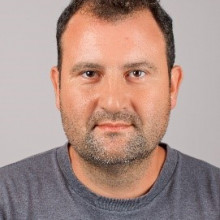
Dr. Theodoros Manouras is currently a research associate in the Department of Materials Science and Technology of the University of Crete and a member of the Hybrid Nanostructures Group of the Institute of Electronic Structure and Laser, Foundation for Research and Technology. He received his B.Sc in Materials Science from the University of Patras (Greece) in 2005 and his M.Sc. and PhD in Polymer Science from the University of Athens (Greece) in 2007 and 2012, respectively. He was a PhD scholar in the National Center of Scientific Research “Demokritos” (Greece) working on the development of novel polymeric materials for lithographic applications and bioapplications.
Career
- 2012, PhD, Chemistry Department, University of Athens, Greece and Institute of Microelectronics, National Center of Scientific Research “Demokritos”, Greece
- 2007, M.Sc, Chemistry Department, University of Athens, Greece
- 2005, B.Sc, Department of Materials Science, University of Patras, Greece
Interests
- Design and synthesis of novel ‘smart’ polymers of various architectures (linear, star, bottlebrush, brushes, etc)
- Biocidal and antifouling materials
- Self-assembly of polymeric materials
- Polymer electrolytes
- Polymers for drug delivery
- Lithographic applications (EUV, laser, DUV, hot tip lithography etc)
- Organic photochemistry
Awards/Prizes/Distinctions
- 2018 - Research scholarship for 2 years through the ‘support of new scientist’ program from the Hellenic Republic Ministry of Education
- 2018 - Best poster award, 12th Hellenic Polymer Society International Conference, Ioannina
- 2015 - Best poster award, QualityNano Conference, Crete
- 2014 - Best poster award, 10th Hellenic Polymer Society Conference, Patras
- 2007 - PhD scholar in Institute of Microelectronics (IMEL) of National Center of Scientific Research "Demokritos" (Greece)

Dr Athanasia Kostopoulou received her B.Sc. degree in Physics (2004) and her M.Sc. degree (2006) on Materials Physics & Technology from the Physics Department at the Aristotle University of Thessaloniki. Since 2012, when received her Ph.D. from the Chemistry Department at the University of Crete, she is a Postdoctoral Fellow in the Institute of Electronic Structure and Laser at FORTH (Heraklion). Since 2018 and for the next three years, she is coordinator of the program for new researchers with title “Low-Temperature Growth of Perovskite Nanosystems for High-Performance Perovskite Solar Cells” financially supported by General Secretariat for Research and Technology (GSRT) and the Hellenic Foundation for Research and Innovation (HFRI). She is working on the chemical synthesis and elucidation of the microscopic physical mechanisms involving nanocrystal systems of different chemical phases and morphologies (magnetic and semiconducting).
Education
- 2012 Ph.D. in Chemistry – Department of Chemistry, University of Crete, Greece
- 2006 Master in “Materials Physics and Technology” – Physics Department – Aristotle University of Thessaloniki, Greece
- 2004 Bachelor in Physics – Physics Department – Aristotle University of Thessaloniki, Greece
Career
- 10/2018 -Today, Coordinator of the program “Low-Temperature Growth of Perovskite Nanosystems for High-Performance Perovskite Solar Cells” financially supported by General Secretariat for Research and Technology (GSRT) and the Hellenic Foundation for Resea
- 9/2016 – 09/2018, Post-doc Fellow, Institute of Electronic Structure & Laser, FORTH, Heraklion, Crete, Greece
- 1/2013 – 12/2014 Post-doc Fellow, Institute of Electronic Structure & Laser, FORTH, Heraklion, Crete, Greece
- 10/2003 – 06/2004 Program, “ePhys: Towards and effective use of ICT for Open Learning in Teaching of Physics in Europe”, Physics Department, AUTH, Thessaloniki, Greece
- 09/2005 – 12/2005 Program, “ePhys: Towards and effective use of ICT for Open Learning in Teaching of Physics in Europe”, Physics Department, AUTH, Thessaloniki, Greece
Interests
- Synthesis of nanocrystals by using Glove-Box and Schlenk techniques for applications in biology (MRI, hyperthermia, theranostics), energy conversion (photovoltaics) and storage (batteries)
- Magnetic, metallic or semiconducting nanocrystals of one or more chemical phases in centrosymmetric or anisotropic structures
- Laser-induced synthesis of nanocrystals
- Films of nanoparticulate systems
- Structural analysis of the nanocrystals by using Powder X-Ray Diffraction and High-Resolution Transmission Electron Microscopy (HRTEM)
- Optical characterization by using UV-Vis and PL Spectroscopy
- Magnetic characterization by using SQUID Magnetometry
- Elucidation of the microscopic physical mechanisms involving nanocrystal systems of different chemical phases and morphologies (magnetic and semiconducting)
Awards/Prizes/Distinctions
- 2018, Coordinator of the program for young researchers with title “Low-Temperature Growth of Perovskite Nanosystems for High-Performance Perovskite Solar Cells” financially supported by General Secretariat for Research and Technology (GSRT) and the Hellen
- 2016, Team leader that excelled in the 10 best in the category for Applied Research in the 3rd Competition "Greece innovates!" Organized by Eurobank and SEV
- 2016 - 2017 FELLOWSHIP OF EXCELLENCE FOR POSTGRADUATE STUDIES IN GREECE- SIEMENS PROGRAM
- 2015, Best poster presentation: 20th International Conference on Magnetism, Barcelona
Dr. Kyriaki Kosma received her Degree in Physics from the Physics Department of the University of Ioannina in 2004. She received her PhD in experimental Physics from the Physics Department of the Ludwig Maximilian University in Munich. Her research focused on ultra-short pulse generation in the near IR and UV/VUV spectral range with applications in laser-matter interactions, and the investigation of femtosecond molecular dynamics during ultrafast photo-induced reactions with the pump-probe technique. She continued her research as a post-doctoral fellow in Berlin, in the Laboratory for Free Clusters and Molecules, in Max-Born Institute for Nonlinear Optics and Short-pulse Spectroscopy. Currently, she is a member of the Institute of Plasma Physics and Lasers.
Career
- IESL -FORTH, Post Doc (2016-2017)
- Technical Educational Institute of Crete, Center for Plasma Physics & Lasers (CPPL), Post Doc (2017-today)
Interests
- Optical physics/non linear optics
- Molecular spectroscopy
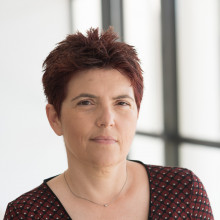
Dr. Maria Konstantaki is a Principal Application Scientist at the Institute of Electronic Structure and Laser, Foundation for Research and Technology – Hellas (FORTH). She holds a Ph.D. in Electronic and Electrical Engineering from the University of Strathclyde, Scotland, and a B.Sc. in Physics from the University of Crete, Greece. She has over two decades of expertise in advancing the science and technology of optical fiber sensor design and development.
She has played a key role in numerous European research initiatives as Deputy Principal Investigator in major Horizon Europe and Horizon 2020 projects, contributing to the development of photonic technologies and innovation networks across Europe. Alongside her research, Dr. Konstantaki has broad experience in academic teaching and mentoring. Dr. Konstantaki has authored 44 publications in peer-reviewed international journals and more than 60 conference proceedings.
Education
- 1997, Ph.D., Department of Electronic and Electrical Engineering, University of Strathclyde, Scotland
- 1993, BSc, Department of Physics, University of Crete, Greece
Career
- Since 2017, Principal Application Scientist, Institute of Electronic Structure and Laser (IESL), Foundation for Research and Technology-Hellas (FORTH), Greece
- 2013-2017, Adjunct Lecturer, Department of Electrical Engineering, Technological Educational Institute of Crete (TEI), Greece
- 2001-2012, Adjunct Lecturer, Department of Informatics Engineering, TEI, Greece
- 1998-2016, Laboratory Research Scientist, IESL, FORTH, Greece
- 1994-1996, Marie Curie PhD Research Fellow, University of Strathclyde, Scotland
Interests
- Optical fiber sensors





